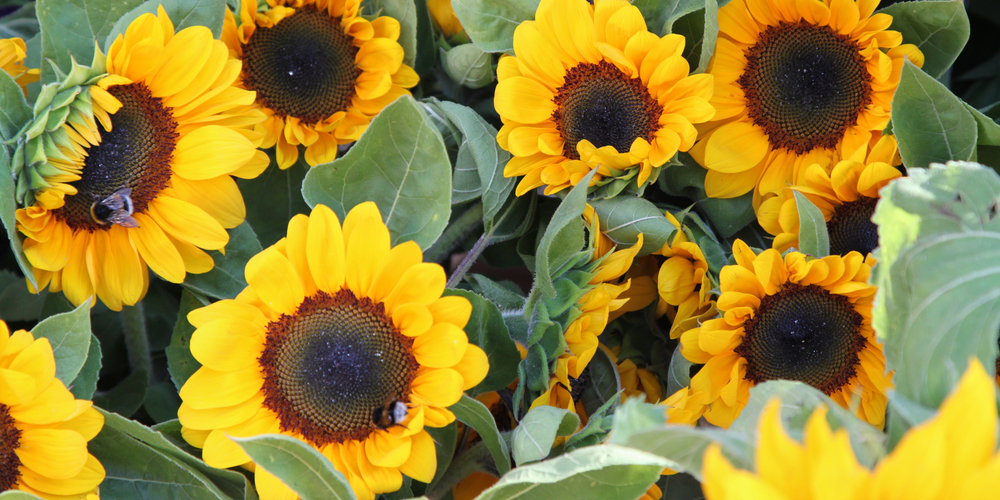Sunflowers make for some of the most colorful and cheerful plants for gardens. Their radiating yellow petals bring to mind summer warmth and fall sunshine.
When it comes to growing, many gardeners like sunflowers not only because they are downright beautiful but also because they are drought-tolerant, quick to grow, and attractive to pollinators. One more thing to note, sunflowers grow best in full sun and need long, hot summers to bloom. This leaves many people living in colder regions wondering whether sunflowers can grow in cold weather.
Quick Answer
Generally, sunflowers are sensitive to cold weather but these sun loving flowers can grow in areas where the weather is mild.
Well, while sunflowers are warm-natured plants known to have no tolerance to freezing temperatures, some data shows that they can withstand temperatures as low as 25 degrees Fahrenheit. This post will cover more on growing sunflowers, emphasizing growing in cold weather.
Can sunflowers survive frost?
Sunflowers are fairly frost-sensitive. Their seedlings, although they have an extremely low frost tolerance, often escape damage from light frost. On the other hand, mature sunflower plants need plenty of sunlight to bloom and produce seeds. As such, frost poses a serious threat to sunflowers, especially when the first fall happens before the sunflowers have bloomed.
According to this post by the North Dakota State University, sunflowers are most vulnerable to frost damage at bud and flowering. Temperatures between 28 and 30 degrees Fahrenheit can damage buds and result in sterile sections or rings in the flowering head – the big flower usually surrounds hundreds of teeny tiny flowers that turn into seeds. If the temperature drops below 28°F at the bud stage, the bud will get damaged, and seeds won’t develop.
On the other hand, once pollination occurs and petal drops, sunflowers can tolerate temperatures as low as 25°F without significant damage.
Generally, cold weather will likely kill sunflowers, whether they are seedlings or mature plants. That’s why it is important to do proper timing and plant, preferably, around 100 days to anticipate first frost fall.
Proper Weather Conditions for Sunflowers
The tall giant sunflowers are the most commonly known. However, there are plenty of other varieties, which come in a broad range of heights and colors. That said, while some varieties may have precise growing requirements, most varieties and cultivars of sunflowers have very similar needs for healthy growth.
First off, sunflower seeds only germinate in warm, well-drained soil. Depending on where you live and the normal planting season, you may want to wait until the soil temperature is consistently 70°F to 75°F. However, planting anytime when the soil temperature is consistently over 50 degrees is acceptable.
It is worth noting that sometimes soil warms more slowly than air. For this reason, gardeners living in colder regions may need to verify the soil temperature using a soil thermometer before sowing. Cool, wet soil may cause sunflowers seeds, or young roots to rot, and you don’t want this to happen. That’s why it is discouraged to plant sunflowers too early in spring when the weather is likely to result in soggy, waterlogged soil.
Talking succinctly about sunlight requirements, sunflowers, as the name suggests, require plenty of sunlight to thrive and flower well. They do not need light to germinate, however.
After germination, sunflowers need at least 6-8 hours of daily sunlight to grow best. This is a critical consideration when choosing a planting site – optimal temperatures for growing sunflowers are 70 to 78 degrees Fahrenheit.
Essential notes on growing sunflowers
In ideal conditions, sunflower seeds germinate within 7 to 10 days after planting. Because they don’t like it when their roots are disturbed, it is best to sow them directly in your flower bed.
Importantly, if you live in colder regions and want to germinate your sunflowers indoors as you wait for the soil to reach ideal temperatures, make sure to sow the seeds in plantable peat pots. Because these pots decompose in the soil, they will save you from disturbing the seedling roots.
Depending on the variety you plant, the time between germination and flowering will vary between 60 to 100 days. For the best results, choose a type that will complete its life cycle while the weather is favorable.
Can Sunflowers Grow In Cold Weather: Conclusion
Generally, sunflowers are sensitive to cold weather. However, this doesn’t mean gardeners in colder regions can’t grow this sun-loving flower. With varieties maturing after about days, enthusiastic gardeners living in areas with a short planting season and limited sunny weather can enjoy the spring colors of sunflowers.
Related Article: When to Plant Sunflowers?


